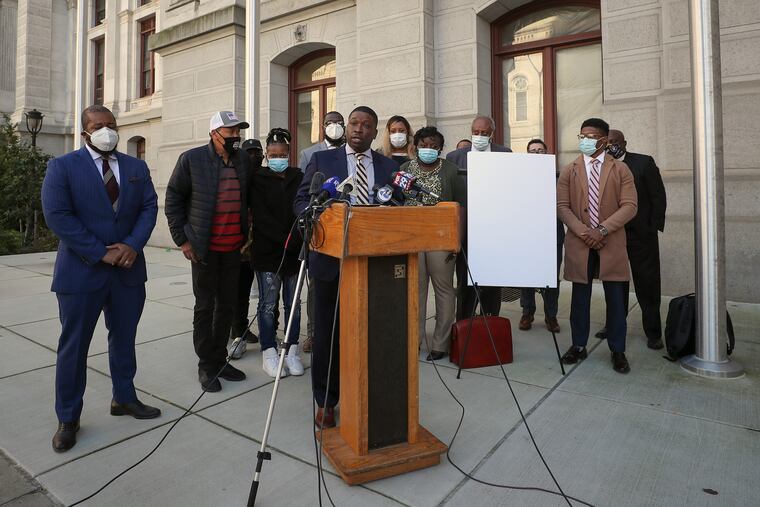Family of Walter Wallace Jr. sues Philadelphia police officers who fatally shot him
Johnson said a separate lawsuit would be filed against the city in federal court, alleging that inadequate police training and the failure to equip the officers with Tasers led to Wallace’s death.

The family of Walter Wallace Jr., the West Philadelphia man whose fatal shooting by Philadelphia police in October set off days of protests and unrest in the city, filed a wrongful-death lawsuit Thursday against the two officers who killed him.
The suit, filed in Common Pleas Court, accuses Officers Sean Matarazzo and Thomas Munz Jr. of using unreasonable force when they shot Wallace more than a dozen times outside his family’s home after he approached them with a knife amid what relatives said was a mental health crisis.
“He was gunned down in front of his mother, in front of his siblings, his father, his wife. Everyone is seeing a psychiatrist right now,” said the family’s lawyer, Shaka Johnson. “I can’t even wrap my mind around the concept of watching your kid gunned down at the hands of police. ... They will never be the same again.”
Johnson said a separate lawsuit would be filed against the city in federal court, alleging that inadequate police training and the failure to equip the officers with Tasers led to Wallace’s death.
The case could represent the most significant claim to emerge out of a year when the city, like much of the nation, was rocked by protests, violence, and a renewed scrutiny on racism and policing. And it was filed as testimony continued in the trial of Derek Chauvin, the former Minneapolis police officer whose actions in the death of George Floyd sparked worldwide protest and unrest. In March, the Minneapolis City Council approved a $27 million settlement with Floyd’s family to resolve a lawsuit over his death.
.
In the Wallace case, the officers fired a volley of bullets as he walked toward them with a knife and refused to drop the weapon despite their repeated calls for him to do so.
Police were called to the home in the 6100 block of Locust Street after Wallace’s sister, brother, and a neighbor made frantic 911 calls, pleading for police to come to stop him from attacking his parents. Screams could be heard in the background of those calls.
Wallace, 27, was an aspiring rapper, a father of nine with a daughter due days after his death, and had a history of battles with mental health and a criminal record. His killing sparked protests in his neighborhood and across the city as people denounced the use of police force against him. His family and others questioned why nonlethal options like Tasers or shooting to wound weren’t used, why more attention wasn’t paid to his history of mental illness, and whether racial bias might have played a role in the shooting. Wallace was Black. The officers who shot him — Munz, 26, and Matarazzo, 25 — are white.
Body camera footage and 911 calls released by the city depict a chaotic scene outside the family home on the night of Oct. 26. The footage shows Wallace coming to the door of the family’s home holding a knife, then slowly walking into the street toward police as they shouted for him to drop the weapon. Family screamed “no,” and Wallace’s pregnant wife shouted that her husband was “mental.”
“Shoot him,” one of the officers is heard telling the other, before firing 14 shots at Wallace as he collapsed to the ground in the street.
» READ MORE: Calls to ‘defund the police’ intensify after Philadelphia police killing of Walter Wallace Jr.
“You killed my son!” Wallace’s mother, Kathy Brant, is heard screaming, as witnesses rushed to surround Wallace.
“He was f— chasing us,” one of the officers told a colleague as police scrambled to put Wallace in a car to take him to the hospital.
Johnson has said the two officers who shot Wallace should be fired. He’s also called for sweeping reforms in city policing and its mental health services. He said the family decided to sue after negotiations with the city broke down on their demands that the city take responsibility for Wallace’s death, issue Tasers to all officers, and properly train them to use them.
“I’m telling you, none of that has been done to this point — zero,” Johnson said.
Officials at the city Law Department declined to comment Thursday because they had not seen the lawsuit. Police officials also declined to comment, citing a policy of not addressing ongoing litigation. Efforts to reach Matarazzo and Munz were unsuccessful.
The shooting remains under investigation by police Internal Affairs and the District Attorney’s Office.
Johnson said the lawsuit did not specify a monetary amount to compensate the family and would instead leave that decision to a jury.
“What dollar amount could begin to atone for what those officers did and what the City of Philadelphia did by not providing them with the adequate equipment to deal with people with mental health challenges,” he said.